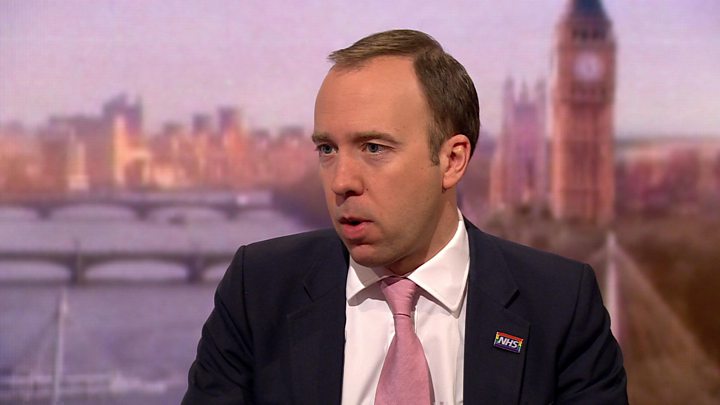Coronavirus: 'Nothing ruled out' in government's virus battle tactics

No tactics will be "off the table" in the UK government's plan to contain coronavirus, the health secretary says.
Matt Hancock said an emergency "battle plan", drawn up if the virus spreads further, includes banning big events, closing schools and dissuading people from using public transport.
He told the BBC's Andrew Marr the plans were for the "worst-case scenario".
Mr Hancock said the UK remained in the "containment" phase with 23 confirmed cases - but more are expected.
The government contingency plans, which will be published this week, include that newly-retired doctors and nurses could be asked to return to the NHS.
If the outbreak worsens, people could also be urged to work from home.
A minister in every government department will focus on tackling the virus, which causes the Covid-19 disease, while a team of experts will drive a public health campaign.
Speaking on the BBC's Andrew Marr Show, Mr Hancock said there were four phases to the plan:
- Containment - caring for any infected people and identifying their close contacts
- Delay - deciding what actions to take to slow down the spread
- Mitigation - damage limitation if the virus spreads widely
- Research - constant and ongoing work to inform the three other phases
Currently, the UK is in the "containment" phase - which health leaders say may still be sufficient.
But the next phase could see broader "social distancing" measures.
Rules around class sizes in schools could also be relaxed in the event of widespread staff shortages.
Asked if UK cities could be shut down, as has happened where the virus originated in China, Mr Hancock said: "There is clearly a huge economic and social downside to that. But we don't take anything off the table at this stage because you have to make sure you have all the tools available if that is what is necessary."
He added: "Under the worst-case scenario we would have to take some quite significant actions that would have social and economic disruption."
Labour shadow health secretary Jonathan Ashworth said Mr Hancock must give more detail of any emergency powers he wants to bring in so that MPs "can properly scrutinise" the plans.
Emergency powers designed to restrict the virus if it became endemic would only be "temporary", Mr Hancock said - adding that it was "inevitable" the scale of the virus would worsen.
He also said "a lot more resources" were being put into the NHS 111 helpline as the number of calls rose by 50% over the last week.
On Saturday evening, Willow Bank Infant School in Woodley, Berkshire, issued a statement saying one of its members of staff had tested positive for coronavirus - and it would be closing for a deep clean.
Meanwhile, more than 200 British holidaymakers locked down at a quarantined hotel in Tenerife have been told they will be allowed to fly home, if they test negative for the virus.
The travellers have been quarantined at the H10 Costa Adeje Palace hotel since Tuesday after four Italians contracted the virus. Some have already been allowed to leave but others are awaiting test results.
The Foreign Office is in contact with operators and travel agents about their plans to return Britons to the UK.
While the virus can be present but undetectable in a test, BBC correspondent Dan Johnson said advice for the hotel guests was that there is a 24-hour window after a negative test when people are not infectious, and are therefore safe to fly.
The government's response is based on existing plans for a pandemic flu outbreak - but has been adapted for the coronavirus.
What do I need to know about the coronavirus?
The plan includes holding extra meetings for the government's emergency committee, Cobra, which is already scheduled to meet on Monday.
Prime Minister Boris Johnson, who will chair Monday's meeting, said: "Coronavirus may very well be a challenge in the weeks and months ahead.
"But I have no doubt that with the help of the NHS and its incomparable staff this country will get through it and beat it."

A team of scientists and media experts will also be set up to work on a public information campaign from a so-called "war room" in the Cabinet Office. This will see posters and social media adverts telling people to wash their hands for 20 seconds or more with soap and water.
Whitehall officials say they will be working closely with their counterparts in the devolved administrations.
Meanwhile, the Scottish government said it was increasing tests for coronavirus to all people with flu-like symptoms, even those who have not travelled to an affected area. No one in Scotland has so far tested positive.
Mr Hancock said "every part of government" was working together to tackle "the health, economic, and social impacts" of the virus - "but cannot do this alone".
"Every single person has a role to play in helping to manage the spread of the virus - whether that's washing your hands more often, catching your sneezes, and following clinical advice," he said.
More than 10,000 people have now been tested for the virus in the UK.
The Berkshire school staff member is thought to be among three UK coronavirus cases confirmed on Saturday.
Ten more cases of the virus in the UK in just over two days might raise eyebrows, but health officials say all but one can be easily explained because the patients have travelled from the most affected countries, including northern Italy and Iran.
Since the first UK cases were confirmed in York - two Chinese nationals - positive tests have been recorded in the south of England, Derbyshire, south Wales and Northern Ireland.
Of potential concern is the case in Surrey, a man who had not travelled abroad.
Public health officials are tracing his contacts to see if his infection can be explained by another individual who has arrived in the UK from abroad.
In other developments:
On Friday the World Health Organization raised its global risk assessment of the virus to its top level, "very high".
Globally, more than 86,000 people have been infected, with cases in more than 50 countries. About 3,000 people have died - the vast majority in China's Hubei province, where the outbreak originated in December.
Have you been affected by coronavirus? You can share your experience by emailing haveyoursay@bbc.co.uk.
Please include a contact number if you are willing to speak to a BBC journalist. You can also contact us in the following ways: